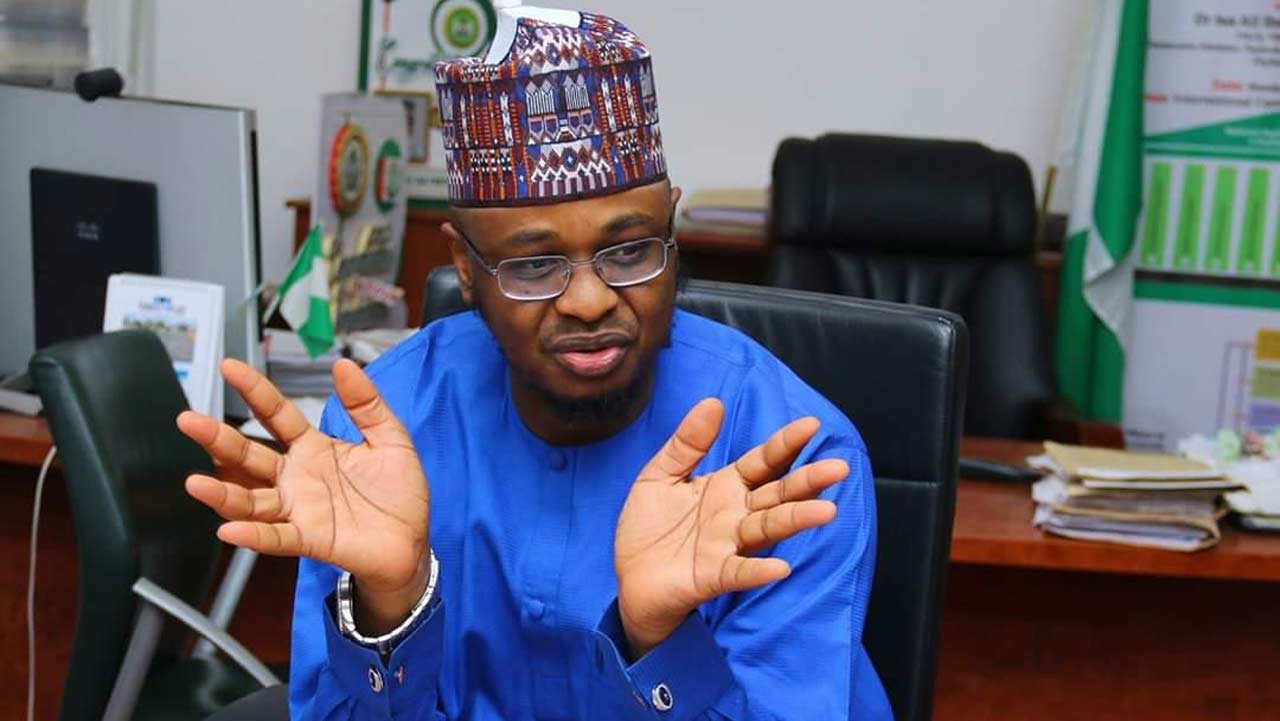
The Minister of Communications and Digital Economy, Dr. Ibrahim Pantami, on Monday, commended the Executive Vice Chairman/CEO of the Nigerian Communications Commission (NCC) Prof. Umar Danbatta and the Director-General, National Information Technology Development Agency (NITDA), Mallam Kashifu Abdullah for their efforts in the rollout of the Ministry’s projects across the country.
He said projects being commissioned today were executed by NCC and NITDA as part of the Ministry’s efforts in accelerating the development of Nigeria’s digital economy, adding that all the projects are carefully thought-out and executed efficiently, with a view to ensuring the sustainable growth of Nigeria’s digital economy, across the entire country.
Pantami, said: “They play a major role in the development of Nigeria’s Digital Economy for a Digital Nigeria, in line with the mandate of Mr President to our ministry as well as the Federal Government’s key objectives of improving security, reducing corruption, and expanding the economy. Furthermore, it is also worth noting that these projects are part of the policies of the Ministry that the parastatals are to implement.
“The 5 initiatives being commissioned today represents only a few of the projects being executed by the Ministry and its Parastatals in all States across the country and the Federal Capital Territory. The 5 initiatives being commissioned today are as follows:
“National Policy on Virtual Engagements in the Federal Public Institutions, Emergency Communication Centre, Akure, Ondo State, Digital Economy Centre, Federal University Gashua, Yobe State, Digital Economy Centre, Delta State University Abraka, Delta State and the Digital Economy Centre, Government Secondary School, Rigasa (Main) Kaduna State.”
According to him, the COVID-19 pandemic has compelled many organizations across the globe to make use of virtual platforms for meetings and other interactions.
There has been a major transition from physical meetings to online meeting and much as these changes are welcome, there is no provision for such meetings in the Public Service Rules, the Minister, said.
“This is why we developed the National Policy for Virtual Engagements in the Federal Public Institutions, in collaboration with the Office of the Head of the Civil Service of the Federation.
“This policy was approved at the Federal Executive Council on the 14th of October 2020 and the implementation commenced immediately after its approval at the Council.
“The National Policy for Virtual Engagements in Federal Public Institutions was developed to institutionalize frameworks and standards within Ministries, Departments and Agencies of Government as well as Government-owned companies using virtual engagement as an administrative procedure in service.
“The effective implementation will tremendously improve service delivery and reduce the cost of governance as overhead cost elements such as avoidable local and foreign tour/travel for training and capacity building meetings will be reduced. It will also cut down expenditure on hosting and servicing of meetings.
“Our physical-virtual hybrid approach to the commissioning of projects has been very successful and we are very pleased to commission Batch 10 of projects executed by the parastatals under the Ministry. This approach results in substantial savings for the country as it reduces the need for airfare, duty tour allowance and related costs. The fact that we are commissioning the projects simultaneously also leads to savings for the government.” He said.
For these reasons, it is important that we ensure that the policy is effectively implemented. I, therefore, invite all MDAs, Parastatals and Government-owned companies to familiarize themselves with the provisions of the Policy and ensure full compliance.
He added that the Digital Economy Centre (DEC) was deployed by NITDA, stressing that it is a solar-powered IT Centre equipped with computers, internet access and tools aimed at enhancing skills development, bridging the digital divide and promoting innovative digital solutions that will address challenges facing the country.
He added: “It supports economic growth by ensuring digital inclusion for the underserved/unserved communities and supports capacity-building efforts.
“The Centre would among other things, serve as a capacity Building Centre to enable the promotion of knowledge-based economic growth, an avenue for creating jobs and providing access to information, knowledge and government enabled digital services for rural communities.’
He also acknowledged that it is an avenue for stimulating economic growth by creating new products, increasing productivity and promoting new commercial and administrative methods, a platform to enhance the abilities of communities to access information, manage local level information and disseminate this information to external communities, and environment to nurture Innovation and develop training and professional programs to promote self-employment and entrepreneurship; and a platform to provide & promote professional IT skill to the community, equipping them with industry-oriented quality education and training.”
According to him, the Emergency Communications Centre (ECC) project was set up to promote and enhance public safety through the use of the 112 number, designated as the Universal Safety and Emergency Assistance Number for telephone services generally encourage and facilitate the prompt deployment of a seamless, ubiquitous and reliable end-to-end infrastructure for emergency communications needs.
The ECC project is being deployed by the Nigerian Communications Commission (NCC) across the country and it will offer the following benefits: Universal, toll-free emergency telephone access for members of the public in times of distress/emergency; and a one-stop shop for receiving distress calls from the public and dispatching same to appropriate Response Agencies (Police, FRSC, Fire Service and Ambulance Service.
According to him, this will ensure that there is an effective emergency response to cater to the needs of our citizens, explaining: “want to use this opportunity to encourage all the host communities of these interventions provided by the Federal Government of Nigeria through NITDA and NCC to ensure that they take full advantage of the facilities for the benefit of their communities.”